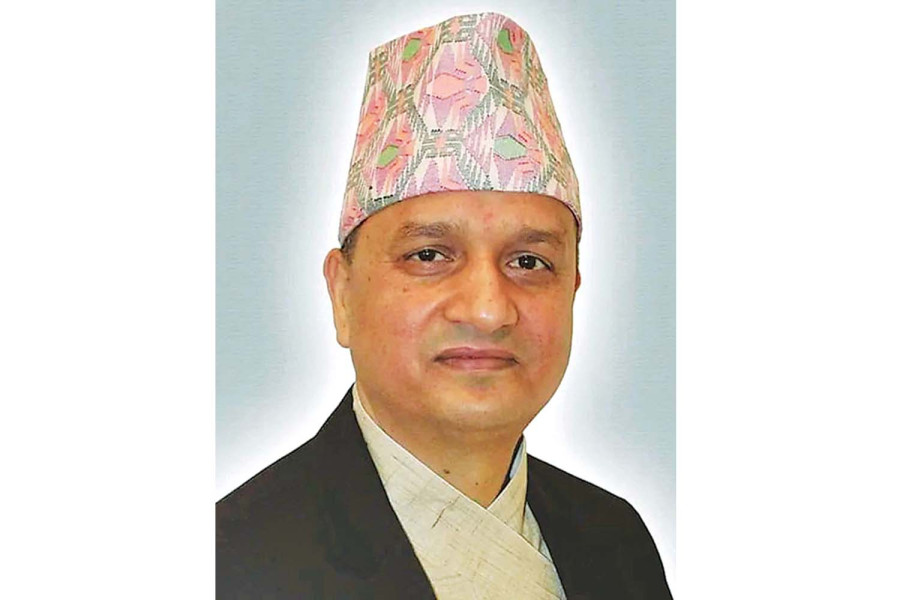National
Petition throws governor appointment into limbo
The race for central bank head has been marred by intense lobbying by various individuals and interest groups.
Anil Giri
As the government is set to appoint a new governor of Nepal Rastra Bank, a supplementary writ petition has been filed in the Supreme Court on Friday to prevent Gunakar Bhatta’s potential appointment to the post.
Bhatta, who served as executive director of the central bank until Friday, has emerged as a frontrunner for the top post.
The same petitioners had earlier filed a writ petition against a government decision to revise the age limit to allow individuals over the age of 65 to be appointed as officials or members of the public bodies including the Governor of the Nepal Rastra Bank. The Supreme Court on April 15 issued a short-term interim order barring the government from enforcing the revised criteria.
Bhatta resigned from his post on Friday, but his resignation has yet to be approved by Acting Governor Nilam Dhungana, who is also in the race for governor.
The governor appointment process has become increasingly contentious, as many individuals and interest groups have been lobbying over the past month to push their preferred candidates.
According to the Nepal Rastra Bank Act, a new governor should be appointed at least a month before the incumbent’s retirement. Although Maha Prasad Adhikari retired on April 4 after completing his term, the government has been dragging its feet on the appointment.
A three-member search and recommendation committee led by Finance Minister Bishnu Poudel formed to suggest a name has also failed to make a recommendation.
Interestingly, the petitioners have not raised questions against Prakash Shrestha, another executive director of the Nepal Rastra Bank who also resigned and is reportedly eying the governor’s post.
The petition was filed after top leaders of the key ruling parties, Nepali Congress and CPN-UML, agreed to nominate Bhatta. However, the Poudel-led committee has yet to recommend Bhatta’s name.
Advocates Bishal Thapa and Prativa Uprety filed the supplementary petition at the Supreme Court claiming that Bhatta does not meet the legal criteria for the post.
The petition states, “The Nepal Rastra Bank Act does not contemplate directly appointing a person who is currently serving as the executive director to the position of governor."
According to Section 15 of the Act, the names of three individuals who are recognised experts in economics, monetary policy, banking, finance, and commercial law, or deputy governors, must be recommended to the Cabinet. Therefore, the petition claims the direct appointment of Bhatta as governor is not legally possible.
The court has listed the case for a hearing on Sunday. In the petition, the Council of Ministers, the Office of the Prime Minister and Council of Ministers, Prime Minister KP Sharma Oli, Nepali Congress President Sher Bahadur Deuba, the Ministry of Finance, the Governor Recommendation Committee, the Central Office of Nepal Rastra Bank, and Bhatta himself have been named as defendants.
The petition has requested the top court to issue an order to prevent the recommendation committee from taking any action, such as nominating unqualified individuals based on political deals, arguing that it goes against the Nepal Rastra Bank Act.
The petitioners have argued that nominating unqualified individuals would prevent the appointment of qualified individuals, in violation of the Act.
There was an agreement between the major ruling coalition parties, Nepali Congress President Deuba and Prime Minister as well as CPN-UML Chairman Oli, to appoint Bhatt as governor. Following this, Bhatta has also submitted his resignation from the position of Executive Director on Friday.
The petitioners also refer to news reports suggesting a division of positions between the ruling parties, such as AIG and governor, indicating that political horse-trading has undermined good governance.
They highlighted that there was an earlier attempt to appoint former governor Yuba Raj Khatiwada, which failed because he was not a deputy governor at the time. As a result, Bijayanath Bhattarai was appointed as the 13th NRB governor. The petition cites this as an example of how political bargaining led to a departure from good governance.
The petition further states, “At that time, Dr Khatiwada was also serving as the Executive Director, and the division of positions clearly violated the principles of good governance.”
The petition points out that, just like Bhatta now, Khatiwada was also blocked by the Act, which led to Bhattarai’s appointment as the 13th governor. After corruption charges were leveled against Bhattarai, Deependra Bahadur Kshetri became the 14th governor, and only then did Khatiwada become the 15th governor.
As the Act mandates that the recommendation for governor must come from among the existing officers of Nepal Rastra Bank, the petitioners argue, the law does not allow appointment of Bhatta as governor.
Additionally, as a result of the April 15 Supreme Court ruling on age limit for public appointments, Rabindra Pandey and former Chief Secretary Rajendra Kishore Khatri were excluded from the race for governor. In the current petition, the Supreme Court is expected to hold discussions with both sides before issuing an interim order on Sunday.
Adding fuel to the controversy, former finance minister Barshaman Pun on Friday accused the government of financial manipulation in the governor appointment process. He stated that the government, which had previously made appointments in various regulatory bodies to serve the interests of vested groups and intermediaries, now wants to appoint the Governor of the Nepal Rastra Bank according to their wishes.
“News reports have been appearing in the media about multi-billion rupee financial deals for the appointment to a position like the governor of the Nepal Rastra Bank, which has a regulatory role,” said Pun. “We want to warn the government not to hand over the responsibility of the Rastra Bank to proxies of vested interests.”




 16.16°C Kathmandu
16.16°C Kathmandu













